2021 PMLA winners, shortlist and judges
The winners, shortlistees and judges of the 2021 Prime Minister's Literary Awards.
Judges 2021
Nonfiction and Australian history panel
Andrew Tink AM (Chair)
Chris Mitchell AO
Troy Bramston
Dr Deborah Hope
Professor Gail Pearson
Fiction and poetry panel
Professor Peter Holbrook FAHA (Chair)
Geoffrey Lehmann
Dr Roslyn Jolly
Peter Craven
Children’s and young adult literature panel
James Roy (Chair)
Demet Divaroren
Erica Wagner
Paula Kelly Paull
Richard Yaxley OAM
Fiction

WINNER: 'The Labyrinth', Amanda Lohrey
The Labyrinth by Amanda Lohrey
WINNER
Shortlist year: 2021
Shortlist category: Fiction
Published by: Amanda Lohrey
Erica Marsden's son, an artist, has been imprisoned for homicidal negligence. In a state of grief, Erica cuts off all ties to family and friends, and retreats to a quiet hamlet on the south-east coast near the prison where he is serving his sentence.
There, in a rundown shack, she obsesses over creating a labyrinth by the ocean. To build it—to find a way out of her quandary—Erica will need the help of strangers. And that will require her to trust, and to reckon with her past.
'The Labyrinth' is a hypnotic story of guilt and denial, of the fraught relationship between parents and children that is also a meditation on how art can both be ruthlessly destructive and restore sanity. It shows Amanda Lohrey to be at the peak of her powers.
About the author
Amanda Lohrey
Amanda Lohrey lives in Tasmania and writes fiction and non-fiction. She has taught politics at the University of Tasmania and writing and textual studies at the University of Technology Sydney and the University of Queensland. Amanda is a regular contributor to the Monthly magazine and is a former Senior Fellow of the Literature Board of the Australia Council. In November 2012 she received the Patrick White Award for literature.
Judges’ comments
Amanda Lohrey has always been a writer of uncompromising artistic purpose who is never content for the novel to be mere entertainment. She has an instinctive, if understated, sense of form and an inimitable novelist's voice. 'The Labyrinth' is the story of a woman with a beloved son all but lost to her in jail. The way in which she seeks a catharsis, and a solace, by creating a labyrinth as a distraction is also an enactment, at once symbolic and literal, of her mood. This is a novel of unusual gravity with a deeply poignant background which is also a quest for some shape and pattern that might give meaning to a life with a diminished horizon. The protagonist's relationship with the eccentric East European stonemason who gives form to her dream is at once exotic and credible. 'The Labyrinth' is shadowed and haunted by strangeness. It is a novel in high realist mode that also has romance elements, if only in the way it encompasses a tragicomic mood and a certain formal audacity that brings to mind the moodiness and restless shifts of late Shakespeare. 'The Labyrinth' has a gravity that outstares everything that may seem grey or gaunt in a literary endeavour where autumn seems to sink to midwinter. It is a work of considerable literary artistry.

'The Bass Rock', Cath Moore
The Bass Rock
Shortlist year: 2021
Shortlist category: Fiction
Published by: Vintage an imprint of Penguin Random House
Surging out of the sea, the Bass Rock has for centuries watched over the lives that pass under its shadow on the Scottish mainland. And across the centuries the fates of three women are linked: to this place, to each other.
In the early 1700s, Sarah, accused of being a witch, flees for her life.
In the aftermath of the Second World War, Ruth navigates a new house, a new husband and the strange waters of the local community.
Six decades later, the house stands empty. Viv, mourning the death of her father, catalogues Ruth's belongings and discovers her place in the past—and perhaps a way forward.
Each woman's choices are circumscribed, in ways big and small, by the men in their lives. But in sisterhood there is the hope of survival and new life. Intricately crafted and compulsively readable, 'The Bass Rock' burns bright with anger and love.
About the author
Evie Wyld
Evie Wyld grew up in Australia and the UK. She is part owner of Review, an independent London bookshop. Her first novel, 'After the Fire, A Still Small Voice', won the John Llewellyn Rhys Prize and a Betty Trask Award, and was shortlisted for the Orange Prize for New Writers, the Commonwealth Writers' Prize and the International Dublin Literary Award. 'All The Birds, Singing' won the Miles Franklin Award, the Encore Award, was shortlisted for the Costa Novel Prize, and longlisted for the Stella Prize and the Women's Prize for Fiction. 'The Bass Rock' was longlisted for the Stella Prize.
Judges’ comments
A dazzling exploration of people and places haunted by past crimes, 'The Bass Rock' uses multiple timeframes to convey the continuity and ubiquity of men's sexual violence towards women and children. The story of Sarah, a girl accused of witchcraft in the early 1700s, is juxtaposed with that of Ruth, a new wife negotiating the rules of a patriarchal society in stiff-upper-lip post-war Britain. Ruth and her generation in turn leave emotional legacies that her step-grand-daughter Viv must negotiate as she sifts through, and tries to survive, her family's hidden history of abuse. Part novel of manners, part gothic fiction, 'The Bass Rock' combines pitch-perfect dialogue and sharp social observation with disturbing evocations of physical trauma and psychic unease. Wyld's ravishingly crisp and vibrant prose launches a full-scale assault upon the willed amnesia that allows so many stories of abuse to remain unspoken and unatoned. By turns horrifying and heart-breaking, 'The Bass Rock' is an exceptional novel for the #MeToo era.
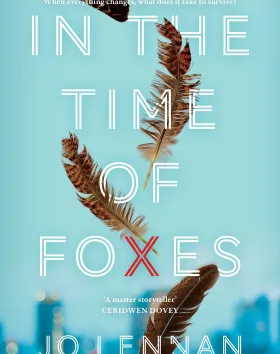
'In the Time of Foxes', Jo Lennan
In the Time of Foxes
Shortlist year: 2021
Shortlist category: Fiction
Published by: Scribner Australia an imprint of Simon & Schuster
'A fox could be a shape-shifter, a spirit being. It could appear in human form if this suited its purposes; it could come and go as it pleased, play tricks, lead men astray.'
A film director in Hackney with a fox problem in her garden; an escapee from a cult in Japan; a Sydney café-owner rekindling an old flame; an English tutor who gets too close to an oligarch; a journalist on Mars, face-to-face with his fate.
The world has taught these men and women to live off their wits. They know how to play smart, but what happens when they need to be wise?
'In the Time of Foxes' is both compellingly readable and deeply insightful about the times in which we live, each narrative a compressed novel. With an exhilarating span of people and places, woven together by the most mercurial of animals, it shows the short story collection at its most entertaining and rewarding, and introduces Jo Lennan as a captivating new storyteller.
About the author
Jo Lennan
Born in Wollongong, Jo Lennan studied in Sydney and Oxford. Jo has worked as a lawyer and writer, contributing to The Economist, 1843, Time Magazine and The Monthly. Her work has featured in the Best Australian Stories and Best Australian Essays anthologies.
Judges’ comments
This classic collection of stories by Jo Lennan does not contain a false note. The author's manner is one of indirection—much of the significance and affective power of these stories lies in what is not said or not grasped by the characters—and it's in her eye for the hidden and unarticulated exchanges of feeling between people that Lennan proves herself an expert and subtle analyst of the human heart. These are stories that refrain from all sermonising and instead grow out of a surefooted instinct for reality. 'The Invitation', the distressing account of a young man's relationship with a wealthy Russian woman, is masterly as an examination of youthful male naivety and vulnerability; and 'The Understudy', about the tense relationship between two actresses, continually obliges us to revise our understanding of both women. 'The Best Left in Europe' is an unassuming tale about two young men on a surfing trip in Spain, and at the same time a wonderfully subtle account of the flows of power and affect between two friends. Lennan's stories do not have a palpable design upon their readers, but are instead distinguished by accurate, precise observation and psychological truthfulness. She shows us fiction can still do what it has always done: hold the mirror up to nature.
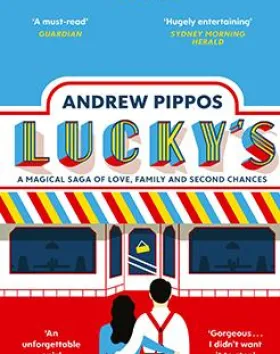
'Lucky's', Andrew Pippos
Lucky's
Shortlist year: 2021
Shortlist category: Fiction
Published by: Picador Australia an imprint of Pan Macmillan
'Lucky's' is a story of family.
A story about migration.
It is also about a man called Lucky.
His restaurant chain.
A fire that changed everything.
A New Yorker article which might save a career.
The mystery of a missing father.
An impostor who got the girl.
An unthinkable tragedy.
A roll of the dice. And a story of love—lost, sought and won again (at last).
Following a trail of cause and effect that spans decades, this unforgettable epic tells a story about lives bound together by the pursuit of love, family, and new beginnings.
About the author
Andrew Pippos
Andrew Pippos spent part of his childhood getting underfoot in his family's Greek-Australian café. When he grew up, he worked in newspapers and taught in universities. 'Lucky's' is his first novel, and it packs in everything he knows about growing up in a noisy, complicated, loving family. He lives in Sydney, where he is a lecturer at the School of Communication, University of Technology Sydney.
Judges’ comments
A natural storyteller, Andrew Pippos is able to spin magic out of everyday events—mixing tragedy and comedy, and bringing to life characters who vacillate between exuberance and stoic rationalism, delusion and self-destructive acts. This debut novel celebrates a vanished Greek Australian cafe culture—the chrome soda fountain and the sizzling steak and eggs. And just as these cafes had two grills—one for the food Aussies liked, and another for Greek specialties which the family privately ate—'Lucky's' has two plots. In the first plot Lucky, a Greek American, is in Australia in 1945 as a US Army mess steward. He's a failed clarinettist. Posing as Benny Goodman, he performs in a Sydney hotel and meets his future wife, from a Greek Australian cafe family. Lucky makes and loses a motza, franchising a unique Greek Australian cafe chain. In the second plot Emily, a failing British journalist, has scored a commission for a New Yorker article about the mass shooting in the last of Lucky's cafes. Emily is only dimly aware of the back story, linking her father to Lucky. Weaving these two plots together took Pippos eight years and is a tour de force. 'Lucky's' is a potential classic.

'A Treacherous Country', Gabriel Fox
A Treacherous Country
Shortlist year: 2021
Shortlist category: Fiction
Published by: Allen & Unwin
Gabriel Fox, the young son of an old English house, arrives in a land both ancient and new.
Drawn by the promise of his heart's desire, and compelled to distance himself from pain at home, Gabriel begins his quest into Van Diemen's Land.
His guide, a cannibal who is not all he seems, leads him north where Gabriel might free himself of his distracting burden and seek the woman he must find. As Gabriel traverses this wild country, he uncovers new truths buried within his own memory.
Authentic, original and playful, 'A Treacherous Country' is a novel of loyalty, wisdom and the freedom to act.
About the author
Gabriel Fox
K.M. Kruimink was born in Tasmania and spent most of her childhood in the Huon Valley, with an interlude on the West Coast. After completing an Arts degree at the University of Tasmania, she lived and worked interstate and abroad for several years. Today, she lives once again in the Huon Valley, now with her husband and daughter. 'A Treacherous Country' is her first novel.
Judges’ comments
The spirit of 'Don Quixote' presides over this off-beat story set in nineteenth-century Australia. Gabriel Fox, the novel's well-intentioned but hopelessly naïve narrator-protagonist, travels from England to Van Diemen's Land to fulfil a commission for the formidable Mrs Prendergast. If successful, he hopes to win the hand of his beloved Susannah, Mrs Prendergast's ward. In a journey dogged by error and disappointment, Gabriel seems to be drifting further and further from his goal. In fact, his haphazard peregrinations lead him to exactly the discoveries he needs to make and confer fresh insights into the world of repressive privilege from which he comes. Gabriel's wide-eyed innocence and idiosyncratic use of language are estranging devices that comically subvert his authority as the narrator. Seen through his eyes and described by his voice, early nineteenth-century Tasmania becomes a profoundly disorienting place—terrifying, magical, nonsensical, absurd. Yet beneath the surreal surface of Gabriel's story runs a thread of kindness, civility and, eventually, wisdom. Working at the intersection between the genres of comedy, folk tale and historical fiction, Kruimink has crafted a novel that is at once highly original and deeply humane.
Children's literature
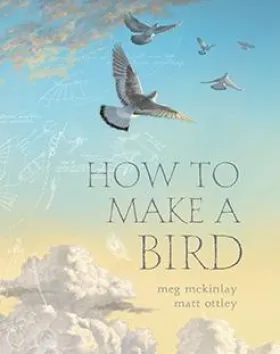
WINNER: 'How to Make a Bird,' Meg McKinlay, Matt Ottley
How to Make a Bird
WINNER
Shortlist year: 2021
Shortlist category: Children's literature
Published by: Walker Books Australia
Winner
From award-winning author Meg McKinlay and celebrated artist Matt Ottley comes a moving and visually stunning picture book that celebrates the transformative power of the creative process from inception through recognition to celebration and releasing into the world. We shadow the protagonist as she contemplates the blue print of an idea, collects the things that inspire from the natural world to shape a bird. And breathes life into it before letting it fly free. It shows how small things, combined with a little imagination and a steady heart, can transform into works of magic.
About the author
Meg McKinlay
Meg McKinlay is the author of a treasure trove of books ranging from picture books and young adult fiction through to poetry for adults. Raised in central Victoria, in a TV- and car-free household, Meg was a bookish kid, in love with words and excited by dictionaries. On the long and winding path to becoming a children's writer, she has worked a variety of jobs including swim instructor, tour guide, translator and teacher. Meg is now a full-time writer and lives near the ocean in Fremantle, Western Australia, where she is always busy cooking up more books.
About the illustrator
Matt Ottley
Matt Ottley is an internationally acclaimed and multi-award winning artist, working equally across the fields of literature, visual arts and music. Matt has a plethora of published picture books to his name and his awards include the CBCA Picture Book of the Year, the Queensland and NSW Premier's Awards for literature, the International IBBY Australia Illustrator Award, and he has also been previously shortlisted for the Australian Prime Minister's Literary Awards.
Judges’ comments
This exceptional picture book is a meditation on the creative process, an exemplar of how creativity and collaboration can transform the simplest of ideas. Its writer knows that in leaving space for the visuals to come, she cannot afford to waste a single word, her poetry complemented by a fine artist given license to add both breadth and focus to the words before him. 'How to Make a Bird' is a magnificent exhibition of treading the narrow line that separates restraint and creative freedom.
Meg McKinlay's words describing the process of making a bird from conception to animation to its bittersweet conclusion are, like all good poetry, about more than what they appear to be. And with the metaphor of creativity and personal growth established, Matt Ottley brings his full talent to bear, adding the most subtle detail and layers of storytelling in a way that elevates the experience of the character without being overbearing or didactic. The result is a book that does what all great art sets out to do—it establishes a contract with the reader: 'If you are prepared to invest and become a part of this collaboration, you will be richly rewarded.' And so it is, drawing the observer into a world that is whimsical without being sentimental, detailed without being cluttered, and effortlessly profound.
Beautifully written, stunningly illustrated and painstakingly designed, this book deserves to be enjoyed by everyone. Young children, early readers, students of poetry and art, the casual coffee-table reader—this book rewards anyone who cares to open it, be it for the first time or the hundredth.
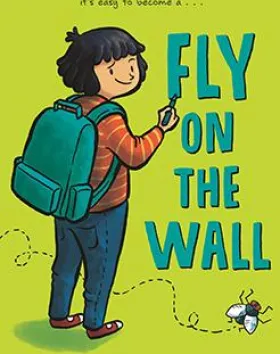
WINNER: 'Fly on the Wall', Remy Lai
Fly on the Wall
WINNER
Shortlist year: 2021
Shortlist category: Children's literature
Published by: Walker Books Australia
Henry Khoo's family treats him like a baby. He's not allowed to go anywhere without his sister/chaperone/bodyguard. His (former) best friend knows to expect his family's mafia-style interrogation when Henry's actually allowed to hang out at her house. And he definitely CAN'T take a journey halfway around the world all by himself!
But that's exactly his plan. After his family's annual trip to visit his father in Singapore is cancelled, Henry decides he doesn't want to be cooped up at home with his overprotective family and BFF turned NRFF (Not Really Friend Forever). Plus, he's hiding a your-life-is-over-if-you're-caught secret: he's the creator of an anonymous gossip cartoon, and he's on the verge of getting caught. Determined to prove his independence and avoid punishment for his crimes, Henry embarks on the greatest adventure ever . . . hoping it won't turn into the greatest disaster ever.
Remy Lai takes readers on an adventure filled with humour, heart, and hijinks that's a sure bet for fans of Jerry Craft, Terri Libenson, and Shannon Hale!
About the author
Remy Lai
Remy Lai studied fine arts, with a major in painting and drawing. She was born in Indonesia, grew up in Singapore, and currently lives in Brisbane, Australia, where she writes and draws stories for kids with her two dogs by her side. She is the author of the critically-acclaimed 'Pie in the Sky' and 'Pawcasso'.
Judges’ comments
Twelve-year-old Henry Khoo is not a baby. His family just doesn't know it yet. Henry lives in Perth with his wuxia drama-loving Popo (grandma), a mother who lays out clothes for him, and an older sister who still enquires whether he peed before leaving the house. As Henry puts it, the view is much better without his family's helicopter blades obstructing it. Henry is also lonely and feels invisible to his school peers, more so since losing a close friendship with his best friend Pheebs. So, he channels his hurt, loneliness, creative and perceptive eye to anonymously create a funny (and sometimes unkind) online gossip cartoon column about staff and students at his school. Yearning for freedom and connection, Henry comes up with The Plan to secretly visit his father, who lives in Singapore.
'Fly on The Wall' is a graphic and prose novel that is warm, funny, thoughtful and innovative. The text and drawings complement each other to create a multi-layered world and a quirky and insightful character who learns to recognise his flaws and correct his hurtful behaviour. One of the most striking aspects of the story is watching Henry's emotional landscape unfold and mature throughout his adventures and connections with others. The visuals add comedic relief to moments of painful truths and insecurities that make Henry so human and relatable. 'You are helpless. You are useless. You are always less, never more,' he berates himself in a moment of panic when he's finally free, a thought that's a side effect of his family's hovering ways.
'Fly on The Wall' is a heartfelt exploration of the awkwardness, joy and pain of coming of age in the shadow of a loving yet overprotective family.
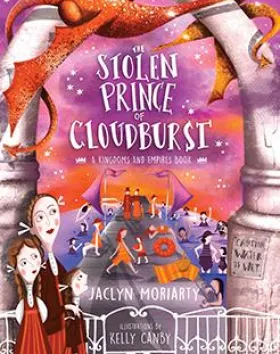
'The Stolen Prince of Cloudburst', Jaclyn Moriarty, Kelly Canby
The Stolen Prince of Cloudburst
Shortlist year: 2021
Shortlist category: Children's literature
Published by: Allen & Unwin
Long ago, the little Prince of Cloudburst was stolen from the seashore by a Water Sprite. Now, ten years later, the prince has found his way home. The King and Queen are planning the biggest party in their Kingdom's history to welcome him. Meanwhile, on the other side of the Kingdoms and Empires, Esther Mettlestone-Staranise is looking forward to another year at Katherine Valley Boarding School. But she arrives to find a number of strange and unsettling changes. For one, her new teacher is rumoured to be an Ogre. Two mysterious students have joined the school, and one of Esther's classmates is an undercover Spellbinder. Most disturbingly, the mountains surrounding the school—usually a delight of glaciers, teashops, lakes and Faeries—are now crowded with wicked Shadow Mages.
As secrets and dangers escalate, Esther must find the answers to several puzzles. Why is her teacher behaving so oddly? Which of Esther's classmates is the Spellbinder, and can they really protect the school from gathering hordes of Shadow Mages? Could the Stolen Prince of Cloudburst be connected?
How can Esther—who is not talented like her sisters, nor an adventurer like her cousin, but just Esther—save her family, her school and possibly her entire world?
About the author
Jaclyn Moriarty
Jaclyn Moriarty is the author of novels for children, young adults and adults, including the internationally bestselling 'Feeling Sorry for Celia' and 'Finding Cassie Crazy', and the multi-award-winning 'Colours of Madeleine' trilogy. The Kingdoms and Empires books, a series of standalone books for 10 to 14-year-olds, include 'The Extremely Inconvenient Adventures of Bronte Mettlestone', 'The Slightly Alarming Tale of the Whispering Wars' and 'The Stolen Prince of Cloudburst'. A former media and entertainment lawyer, Jaclyn grew up in Sydney, lived in the US, the UK and Canada, and now lives in Sydney again.
About the illustrator
Kelly Canby
Kelly Canby is an internationally published illustrator and author of over two dozen books for children. Kelly was born in London, England, but has lived in Australia since the age of three, which is probably around the same age she started playing with pencils and crayons. Kelly applies her quirky style to the pages of everything from picture books, to chapter books, to early reader books, to colouring books and beyond! Kelly's books are published widely throughout the US, UK and Australia.
Judges’ comments
The delightfully named and utterly principled Esther Mettlestone-Staranise takes us on an unpredictable adventure in this sumptuous and often remarkable novel. At Katherine Valley Boarding School, the new-year has brought multiple changes, including two new and mysterious students and the presence of funny, idiosyncratic Mrs Pollock as a teacher. Esther, so often cast by family and friends as 'just Esther', must rise above this unflattering reputation and use her wits and courage to uncover the reasons behind these changes. In so doing, she'll hopefully save her family and school but she may also save a world under threat from odious Ogres and foul Fiends.
Although The Stolen Prince of Cloudburst is part of Moriarty's 'Kingdoms and Empires' series, the novel comfortably stands alone. It is further distinguished by the conviction inherent in the development of the author's superbly imagined world, illustrated in striking fashion by Kelly Canby. Esther is a sparkly and self-deprecating heroine, and Moriarty moves her complex tale adroitly through multiple scenarios and an enormous cast of distinctive, cleverly drawn characters. Her writing is whimsical but never self-consciously so, making it easy to believe in the truths and deceptions of her magical creation.

'The January Stars', Kate Constable
The January Stars
Shortlist year: 2021
Shortlist category: Children's literature
Published by: Allen & Unwin
When twelve-year-old Clancy and her fourteen-year-old sister, Tash, visit their Pa at his aged-care facility, they have no idea that the three of them will soon set out on an intrepid adventure. Along the way there are many challenges for Tash and Clancy to overcome and in the process, they discover their own resourcefulness and resilience and demonstrate their heartfelt love for their grandfather.
About the author
Kate Constable
Kate Constable was born in Melbourne but spent much of her childhood in Papua New Guinea, without television but within reach of a library where she 'inhaled' stories. She studied Arts/Law at the University of Melbourne before working for a record company while she began her life as a writer. Kate has written ten novels for young people, including the internationally-published 'Chanters of Tremaris' series and the CBCA award-winning 'Crow Country'. Kate lives in a northern suburb of Melbourne with her family, a bearded dragon, a rabbit and a dog.
Judges’ comments
Twelve-year-old Clancy and her older sister Tash are left to their own devices when a family crisis takes their parents and younger brother to New Zealand, and their aunt—charged with looking after them—heads off for the weekend. A series of unusual events leads to the sisters whisking Pa, their beloved wheelchair-bound grandfather, away from his aged-care home, in a quest to find him a better life.
The realities of their plan demand a special kind of courage, and as Tash takes charge of the practicalities, Clancy looks to the stars for guidance from her dead grandmother. This blend of magical realism with a story set in a very recognisable contemporary Australia, makes for a gripping adventure and an absorbing and thoroughly enjoyable reading experience.
Clancy's voice—her fears, her mistakes and her instincts—endear her to the reader and we are prepared to follow her everywhere. The three fugitives' eccentric road trip involves taxis, trains and cars, taking them to Pa's old family home, an ashram in the country, a beach house and a mysterious inner-city bookshop. The novel's ending is especially satisfying.
Perhaps most memorable is the deftly conveyed, warm and authentic relationship between the sisters as they come to appreciate each other's strengths and resilience. With writing that is spirited and elegant as it explores multi-generational family dynamics, with a rich cast of engaging, believable characters, this is an immensely satisfying novel, full of heart.
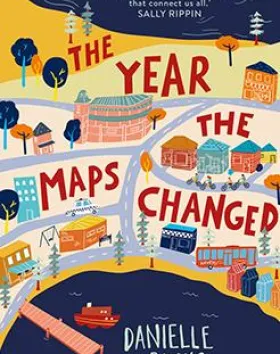
'The Year the Maps Changed', Danielle Binks
The Year the Maps Changed
Shortlist year: 2021
Shortlist category: Children's literature
Published by: Lothian Children's Books an imprint of Hachette Australia
One extraordinary year will change them all...
Sorrento, Victoria, 1999. Fred's family is a mess. Her mother died when she was six and she's been raised by her Pop and adoptive father, Luca, ever since. But now Pop's had to go away, and Luca's girlfriend Anika and her son have moved in. More and more it feels like a land-grab for family and Fred is the one being left off the map.
Even as things feel like they're spinning out of control for Fred, a crisis from the other side of the world comes crashing in. When a group of Kosovar-Albanian refugees are brought to a government 'safe haven' not far from Sorrento, their fate becomes intertwined with the lives of Fred and her family in ways that no one could have expected.
About the author
Danielle Binks
Danielle Binks is a writer, reviewer, agent and book blogger who lives on the Mornington Peninsula. In 2017, she edited and contributed to 'Begin, End, Begin', an anthology of new Australian young adult writing inspired by the #LoveOzYA movement, which won the ABIA Book of the Year for Older Children (Ages 13+). 'The Year the Maps Changed', Danielle's debut middle-grade novel, was a CBCA Notable Book for Younger Readers 2021, longlisted for the ABIA Book of the Year Award for Younger Children 2021, shortlisted for the Readings Children's Book Prize 2021 and longlisted for the Indie Book Awards 2021.
Judges’ comments
This novel examines both the inevitable injustice, but also the wonderful kindness, emerging from the crises of world events. Against the backdrop of Kosova refugees being placed into a nearby 'safe haven', a young girl comes to terms with the moving-in of her adopted father's girlfriend and instant expanded family... and her place in this newly mapped territory. Fred is both generous and inclusive, in ways that are instantly engaging in regard to the newcomers from abroad. As an eleven-year-old, she has to face her own judgement and ability to be 'inclusive' when the boundaries and maps of her home and heart are challenged.
Ultimately this book is a heart-warming neighbourhood story of how things can change for the better with community connection, care and kindness. Readers are reminded how small actions by one young person, and her policeman dad, can change the maps that divide us, and create new homelands for those who desperately need our support, understanding and empathy.
Non-fiction
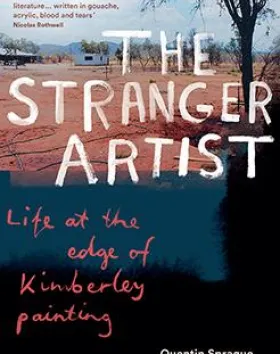
WINNER: 'The Stranger Artist: Life at the 'Edge of Kimberley Painting, Quentin Sprague
The Stranger Artist: Life at the Edge of Kimberley Painting
WINNER
Shortlist year: 2021
Shortlist category: Non-fiction
Published by: Hardie Grant Publishing
At a hinge-point in his life, artist and ex-gallerist Tony Oliver travelled to the East Kimberley, where he plunged into the crosscurrents and eddies of the Aboriginal art world. He would stay for almost a decade, working alongside a group of senior Gija artists, including acclaimed figures Paddy Bedford and Freddie Timms, to establish Jirrawun Arts, briefly one of the country's most successful and controversial Aboriginal painting collectives. 'The Stranger Artist' follows Oliver's journey and the deep relationships he formed, an experience that forever altered his life's trajectory. His story will draw readers close to what he came to know of Kimberley life: the immersion of culture and spirituality in the everyday; the importance of Law; the deep and abiding connection to country; and the humour and tragedy that pervade the Aboriginal world. Evocative and absorbing in equal measure, 'The Stranger Artist' tells not only of the connections that can be formed through the sharing of mutual interests and experiences, but of what it takes to live between cultures.
About the author
Quentin Sprague
Quentin Sprague is a Geelong-based writer who has worked variously as a curator, academic, art coordinator and artist. His essays and criticism have regularly appeared in publications including The Monthly, The Australian, Art & Australia and Discipline, as well as artist monographs and exhibition catalogues. Between 2007 and 2009 he lived on the Tiwi Islands and in the East Kimberley region of Western Australia, where he worked for Aboriginal arts organisations.
Judges’ comments
Amidst the scorched landscape of the East Kimberley, ancient and modern art worlds collide, coalesce and collapse in this searingly honest account of the rise and fall of Jirrawun Arts. Focussing on the relationship between Melbourne art dealer Tony Oliver, who travels to the Kimberley, and First Nations painter, Paddy Bedford, whose natural talent Oliver nurtures and refines, Quentin Sprague tells of an Indigenous artists' collective that began its work on an open-air concrete slab and ended up in a studio designed by a New York architect. This change was funded by the burgeoning commissions the artists earned under Oliver's guidance. Visiting art patrons from down south would sit out on the red dirt in the intense heat and watch the artists at work, before retiring to the best local accommodation for slap up meals. Despite the artists' commercial success: drunkenness, illness, and death haunt the collective and it ends badly, with the studio eventually reduced to a storage shed for rusting machinery. Sprague's hauntingly beautiful descriptions of country, his deep understanding of two cultures in collision, and his sumptuous descriptions of the act of painting, mark this work as a literary gem.
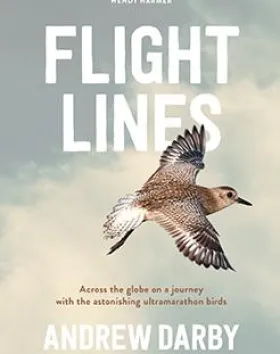
'Flight Lines: Across the Globe with the Astonishing Ultramarathon Birds', Andrew Darby
Flight Lines: Across the Globe on a Journey with the Astonishing Ultramarathon Birds
Shortlist year: 2021
Shortlist category: Non-fiction
Published by: Allen & Unwin
As the sun lowered and turned Gulf St Vincent fiery, they each called a high-pitched 'peeooowiii!', flashed their black wing-pits, spread their tail skirts and took flight.
Andrew Darby follows the odysseys of two Grey Plovers, little-known migratory shorebirds, as they take previously uncharted ultramarathon flights from the southern coast of Australia to Arctic breeding grounds. On these extraordinary flights they chance predators, typhoon weather and exhaustion before they can breed, and maybe return to familiar southern feeding grounds. But the greatest threat to these, and other long-distance migrants on the flyway, is China's dragon economy, engulfing their vital Yellow Sea staging spots.
The author meets the dedicated people working to save these intrepid birds, from Russia to Alaska, from the rim of the Arctic Sea to the coasts of the Southern Ocean. Out of their hard-won science he finds hope for the birds–a bright light for our times.
But his journey to understand this work and these birds almost ends when he is suddenly diagnosed with an incurable cancer. Then he finds science coming to his rescue too.
About the author
Andrew Darby
Andrew Darby is the author of 'Harpoon: Into the heart of whaling', and former Hobart correspondent for the Sydney Morning Herald and The Age on environmental issues and Antarctica.
Judges’ comments
Andrew Darby takes a deep dive into the confounding science of migratory shorebirds, in particular the little-known Grey Plover, to understand and describe their 'ultramarathon' flights between Australia and their Arctic breeding grounds. Immersion in the world of research in the lab and in the field, including vivid firsthand reportage on bird behaviour, wrangling and habitats along the shores of Australia, China, and the United States (Alaska), brings a striking immediacy, power, and beauty to Darby's writing. The narrative device of tracking the previously uncharted flightpaths of two diminutive Grey Plover from the tidal flats of Gulf St Vincent in South Australia to Wrangel Island off the Siberian coast via the mudflats fringing the Yellow Sea contributes significantly to the book's success. The author's investment in the birds' aerial odyssey injects a compelling and sustained tension and focus into a work of drama and global scope that never loses pace. The spare, elegant text transitions seamlessly between documenting what is in many respects a personal journey, investigating avian aerodynamics, analysing flight data, and probing the environmental threats global warming and rapid economic development pose to biodiversity and the staging posts that support migratory shorebirds along their intercontinental route. Nature has rarely seemed so remarkable.

'The Details: On Love, Death and Reading, Tegan Bennett Daylight
The Details: On Love, Death and Reading
Shortlist year: 2021
Shortlist category: Non-fiction
Published by: Scribner Australia an imprint of Simon & Schuster
Tegan Bennett Daylight has led a life in books—as a writer, a teacher and a critic, but first and foremost as a reader. In this deeply insightful and intimate work, Daylight describes how her reading has nourished her life, and how life has informed her reading. In both, she shows us that it's the small points of connection—the details—that really matter: what we notice when someone close to us dies; when we give birth; when we make friends. In life's disasters and delights, the details are what we can share and compare and carry with us. Daylight writes with invigorating candour and compassion about her mother's last days, her own experiences of childbearing and its aftermath (in her celebrated essay 'Vagina'), her long admiration of Helen Garner and George Saunders, and her great loves and friendships. Each chapter is a revelation, and a celebration of how books offer not an escape from 'real life' but a richer engagement with the business of living. The result is a work that will truly deepen your relationship with books, and with other readers. The delight is in the details.
About the author
Tegan Bennett Daylight
Tegan Bennett Daylight is a writer, teacher and critic. Her books include the Stella Award shortlisted Six Bedrooms and the novels Safety and Bombora. She works as a lecturer in English and Creative Writing, and lives in the Blue Mountains with her husband and two children.
Judges’ comments
In the 'The Details, On Love, Death and Reading', Tegan Bennett Daylight has produced essays that are at once amusing, poignant and occasionally outrageously candid. The underlying theme: 'The words of great writers somehow enrich experience.' Daylight explores intimate tales of her own life, including her relationship with her own body and her husband, the death of her mother and the deaths of friends and their mothers. She explores the compelling detail of the writers and books that have most influenced her. Daylight has a deep regard of the writing of Helen Garner and in her own prose shows a similar capacity to enliven ordinary characters and events. Her eye for detail, first fostered by her mother Deborah, enriches the reflections of the author as teacher, daughter, mother, wife and friend. Just as her mother would provide a bored child a selection of books, Bennett Daylight invites the reader to be transported by her discrete yet superbly intertwined, eloquently written essays.
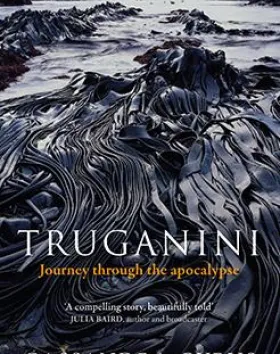
'Truganini: Journey Through the Apocalypse', Cassandra Pybus
Truganini: Journey Through the Apocalypse
Shortlist year: 2021
Shortlist category: Non-fiction
Published by: Allen & Unwin
Cassandra Pybus's ancestors told a story of an old Aboriginal woman who would wander across their farm on Bruny Island, in south-east Tasmania, in the 1850s and 1860s. As a child, Cassandra didn't know this woman was Truganini, and that Truganini was walking over the country of her clan, the Nuenonne.
For nearly seven decades, Truganini lived through a psychological and cultural shift more extreme than we can imagine. But her life was much more than a regrettable tragedy. Now Cassandra has examined the original eyewitness accounts to write Truganini's extraordinary story in full.
Hardly more than a child, Truganini managed to survive the devastation of the 1820s, when the clans of south-eastern Tasmania were all but extinguished. She spent five years on a journey around Tasmania, across rugged highlands and through barely penetrable forests, with George Augustus Robinson, the self-styled missionary who was collecting the survivors to send them into exile on Flinders Island. She has become an international icon for a monumental tragedy—the so-called extinction of the original people of Tasmania.
Truganini's story is inspiring and haunting—a journey through the apocalypse.
About the author
Cassandra Pybus
Cassandra Pybus is an award-winning author and a distinguished historian. She is author of twelve books and has held research professorships at the University of Sydney, Georgetown University in Washington DC, the University of Texas and King's College London. She is descended from the colonist who received the largest free land grant on Truganini's traditional country of Bruny Island.
Judges’ comments
The story of Truganini, long believed by colonists to be the last surviving Aboriginal Tasmanian, has been remembered through a fog of mystery and folklore. Generations of Australians were told of the legend of an old woman who roamed the country of her clan in the 1850s and 1860s. When we look at photographs of her taken in the 1870s, we can only imagine how difficult her life must have been. That extraordinary life, marked by tragedy, defiance, struggle and survival, has now been given the focus that it deserves in Cassandra Pybus's 'Truganini'. For the author, this is a story that is, in part, personal. Her family received a free land grant that covered Tuganini's traditional lands of Bruny Island, in south-east Tasmania. Pybus also draws on the diaries of George Augustus Robinson, the preacher and so-called 'Protector of Aborigines' who was responsible for exiling her people to Flinders Island, which gives a first-hand account of Truganini. This clash of cultures between colonists and First Nation's people is a complex story told with empathy and understanding, perceptive analysis and demonstrates a command of detail through extensive research. It is both a stirring and troubling story but also at times an uplifting and important one.
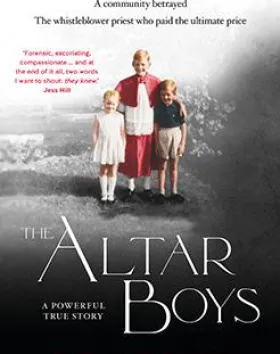
'The Altar Boys', Suzanne Smith
The Altar Boys
Shortlist year: 2021
Shortlist category: Non-fiction
Published by: ABC Books an imprint of HarperCollins Publishers
Proud altar boys, Glen Walsh and Steven Alward, were childhood friends in their working-class community in Newcastle. Steven went on to become a journalist, Glen a priest. But their lives came to be burdened by secrets kept and exposed. Glen's decision to give evidence of a cover-up of clerical abuse ended in tragedy, while Steven fought to overcome a traumatic past. Shortlisted for the 2020 Walkley Book Award, this is an explosive exposé of widespread and organised clerical abuse of children in one Australian city, and how the cover-up extended to every echelon of the Church.
About the author
Suzanne Smith
Suzanne Smith is a six-time Walkley Award and two-time Logie award-winning journalist. Her 27-year career in journalism includes senior editorial roles at the Australian Broadcasting Corporation, including on Foreign Correspondent, Background Briefing, Radio National, ABC News, and Radio Current Affairs. She was the senior investigative reporter and producer at Lateline on ABC TV reporting stories on the cover up of clerical abuse, which helped trigger the Royal Commission into Institutional Responses to Child Sexual Abuse in Australia. She has also written for Crikey and The Australian, and held various roles in the commercial media.
Judges’ comments
Andrew, thirteen years old, suicided. He was one of more than sixty males born between 1959 and 1980 from the Newcastle-Maitland area who suicided, all sexually abused as children by clerics. 'The Altar Boys' charts the criminal conspiracy to commit and cover up clerical abuse. Told from inside the lives of communities, families, and individuals impacted by these crimes, it is a story we only thought we knew: the mother who was lied to, the senior broadcasting executive driven by his secret, the decent priest persecuted by others. Despite the tragedy of otherwise successful lives ended in despair, it is also a story of resilience and courage. In forensic detail, Smith sets out the breathtaking betrayal of a whole community by hundreds of criminal predators and institutional conspirators who knowingly denied all liability. The two great underlying themes of the book are misplaced trust and undeserved arrogance. The work of those who unravelled the crimes and conspiracies—insiders, police and journalists—and the time it took to reveal these, is woven through the lives of the betrayed. These are the ones the book quietly celebrates, and to name some—Andrew, Daniel, 'Brendan', Steven and Glen. This is a compelling account written with style and care.
Young adult literature
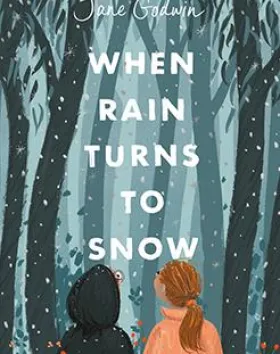
'When Rain Turns to Snow', Jane Godwin
When Rain Turns to Snow
Shortlist year: 2021
Shortlist category: Young adult literature
Published by: Lothian Children's Books an imprint of Hachette Australia
A runaway, a baby and a whole lot of questions...
Lissa is home on her own after school one afternoon when a stranger turns up on the doorstep carrying a baby. Reed is on the run—surely people are looking for him? He's trying to find out who he really is and thinks Lissa's mum might have some answers. But how could he be connected to Lissa's family—and why has he been left in charge of a baby? A baby who is sick, and getting sicker ...
Reed's appearance stirs up untold histories in Lissa's family, and suddenly she is having to make sense of her past in a way she would never have imagined. Meanwhile, her brother is dealing with a devastating secret of his own.
A beautiful and timely coming-of-age story about finding out who you are in the face of crisis and change.
About the author
Jane Godwin
Jane Godwin is the highly acclaimed and internationally published author of many books for children and young people. Children's Publisher at Penguin Books Australia for many years, Jane was the co-creator with Davina Bell of the Our Australian Girl series of historical fiction for middle readers. Jane's books include 'Falling From Grace' and 'As Happy as Here' (a CBCA Notable Book), and picture books 'Go Go and the Silver Shoes' (illustrated by Anna Walker), 'The Silver Sea' (with Alison Lester and patients at the Royal Children's Hospital, Melbourne) and 'Watch This!' (with designer Beci Orpin and photographer Hilary Walker).
Judges’ comments
Lissa has a lot on her mind: fractured family, a tenuous and inscrutable social life, a brother who harbours secrets that render him all but silent, and that's all before the boy Reed turns up, bringing with him his own crushing family pressures that Lissa hopes won't intersect with her own, and something far more precious and demanding of urgent attention. It all feels like way too much.
The suffocation and growing desperation—and at times almost unbearable tension—of Lissa's situation is reflected in the weather. Set in the outer suburbs of Melbourne, and in the shadow of the Dandenong Ranges during the week of the Winter Solstice, the darkness, dampness and unrelenting cold seeps throughout the novel, making the furtive glances through doors left ajar and the hurried visits to the back shed to tend to what is too great a responsibility for any child to have to bear, not to mention the enormous weight of a family and social network spinning out of orbit, all the more relentless and oppressive.
This is a fine book written with great confidence and deft handling—tempered by a sense of hope—of tough subjects, a strong awareness of the endless variables in family life, and a keen ear for the patois and internal monologue affectations of a teenager growing up in 2021. The fact that the main character in this young adult novel is in Year 8 is testament to how much earlier our young people are being forced to grow up, and the complexity of the challenges they face. But perhaps that is the point, even if it's not the 'message'; being a teenager today is harder than it's ever been.

WINNER: 'Metal Fish, Falling Snow', Cath Moore
Metal Fish, Falling Snow
WINNER
Shortlist year: 2021
Shortlist category: Young adult literature
Published by: Text Publishing
Dylan and her adored French mother dream of one day sailing across the ocean to France. Paris, Dylan imagines, is a place where her black skin won't make her stand out, a place where she might feel she belongs.
But when she loses her mother in a freak accident, Dylan finds herself on a very different journey: a road trip across outback Australia in the care of her mother's grieving boyfriend, Pat. As they travel through remote towns further and further from the water that Dylan longs for, she and Pat form an unlikely bond. One that will be broken when he leaves her with the family she has never known.
'Metal Fish, Falling Snow' is a warm, funny and highly original portrait of a young girl's search for identity and her struggle to deal with grief. Through families lost and found, this own-voices story celebrates the resilience of the human heart and our need to know who we truly are.
About the author
Cath Moore
Born in Guyana, Cath Moore is of Irish/Afro-Caribbean heritage. Though raised in Australia she has also lived in Scotland and Belgium. Cath is an award-winning screenwriter, teacher and filmmaker. She holds an MA in screenwriting and a PhD in Danish screenwriting practices. 'Metal Fish, Falling Snow' is Cath's first novel. She lives in Melbourne.
Judges’ comments
Dylan is lost. In her own words, she 'could be anywhere'. The child of an Afro Caribbean father and a French mother—the girl who was predicted to be a boy—this fourteen-year-old whirlwind rages against a world which always seems set to move against her with cold, dispassionate certainty. As Dylan battles to understand and negotiate this world, her rage is fuelled by a single question: how can she possibly survive without knowing where and how she belongs?
'Metal Fish, Falling Snow' is a richly metaphoric tale of a character's dualised search: how to come to terms with the loss of her beloved mother and her own role in that loss; and how to interpret and align her mixed heritage identity. The strengths of the novel lie in the protagonist Dylan's fierce and uncompromised voice, and in the originality of the aesthetic. Moore writes with the technical skill and linguistic panache of an author who is in complete control of her material. Her take on the 'road trip' novel is replete with irony, compassion, humour and near-tragedy, and is further distinguished by Dylan's ability to move between the known and unknown worlds, a device that allows Moore to explore the entanglements of other lives more fully.
'Metal Fish, Falling Snow' is concrete and lace, a multi-layered, poetic work which delves hard and often surgically into the hearts of its characters and allows readers significant insight into the interplay of despair and hope that characterises being human.
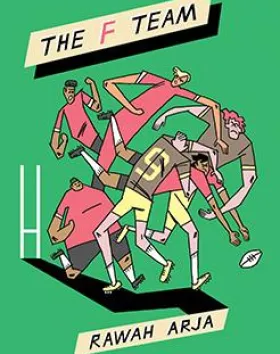
'The F Team', Rawah Arja
The F Team
Shortlist year: 2021
Shortlist category: Young adult literature
Published by: Giramondo Publishing
Meet Tariq Nader, leader of 'The Wolf Pack' at Punchbowl High, who has been commanded by the new principal to join a football competition with his mates in order to rehabilitate the public image of their school. When the team is formed, Tariq learns there's a major catch—half of the team is made up of white boys from Cronulla, aka enemy territory—and he must compete with their strongest player for captaincy of the team.
At school Tariq thinks he has life all figured out until he falls for a new girl called Jamila, who challenges everything he thought he knew. At home, his outspoken ways have brought him into conflict with his family. Now, with complications on all fronts, he has to dig deep to control his anger, and find what it takes to be a leader.
In confronting and often hilarious situations, Tariq's relationships with his extended Lebanese family and his friends are tested like never before, and he comes to learn that his choices can have serious consequences.
About the author
Rawah Arja
Rawah Arja is a writer and teacher from Western Sydney. Her writing has featured in Arab, Australian, Other, SBS Voices and at the Sydney Writer's Festival. She has received a fellowship from WestWords Varuna Emerging Writers' Residential Program, is a member of the Finishing School collective of women writers, and teaches creative writing at schools and workshops.
Judges’ comments
Smart, cocky Tariq Nader is sure of his place in his large, lively family and within Punchbowl's tight-knit Lebanese community. He is also the leader of The Wolf Pack, four boys who comfortably fit the threatening Arab hothead stereotype of the western world. Tariq and boys like him exist on the fringes of mainstream Australia and only make an appearance when their beloved school, Punchbowl High, is featured on the national news for student violence. With the arrival of new principal Mr Archie, however, Tariq is pushed outside his comfort zone and into the fold of Cronulla's Anglo-Australian society, where he must compete on and off the football field to transcend his anger and his own prejudices, and give himself permission to carve a life beyond the limitations of societal stereotypes.
Tariq's voice is raw, intelligent and strikingly honest. 'Do you know what it feels like to wake up and read the stories in the news about how there's no future for boys like us … how little parts of us believe them when they say we're nothing?' he says at one point, exposing his vulnerability. Arwa's characters are unique, flawed and authentic. Take loyal and selfless Uncle Charlie who lives in a shed in Tariq's backyard and covers his grey hairs with his niece's mascara, or eight-year-old 'Bob the Builder' Amira who is sharp, wise and dresses like a tradie. Rawah's characters peel back the many layers of Australian society and bares our flaws, our strengths and our heart on the page. They humanise people from marginalised communities who are not widely represented in young adult literature yet make up an important part of the cultural landscape of modern Australia.
'The F Team' is a powerful, relevant and timely book that questions what it means to be a man, what it means to be human and what it means to be Australian.

'Loner', Georgina Young
Loner
Shortlist year: 2021
Shortlist category: Young adult literature
Published by: Text Publishing
Lona has dropped out of art school and no one is quite sure why, least of all Lona. It's just that nothing in her life seems to make sense anymore, including art. She spends her days sneaking into the darkroom at her old school to develop photographs and her nights DJ-ing at the local roller disco.
Her aimlessness terrifies her, but everyone else appears oblivious to her fears: her parents are bewildered by her sudden lack of ambition, her brother is preoccupied with his new girlfriend, and her best friend Tab seems to be drifting away. Even a budding relationship with a bass-playing, cello-shredding med student isn't enough to shake her existential angst.
Lona knows it's up to her to figure out what she wants to do with her life: the problem is, she has absolutely no idea where to start.
About the author
Georgina Young
Georgina Young is a writer and designer from Melbourne. She has previously had her work published in Voiceworks magazine, as well as in Branches, an anthology published by the Bowen Street Press. 'Loner' won the Text Prize for an unpublished Young Adult manuscript in 2019, and is Georgina's first novel.
Judges’ comments
'No one says anything to Lona. It's like they're scared to. There's this assumption that she knows what she's doing and that no one should question it. She really wants someone to question it. So she can yell at them and tell them they're wrong.'
Lona has dropped out of art school. Vulnerable on the inside and prickly on the outside she doesn't know what's next; she can't find joy or meaning in things she used to do, she's questioning everything, trying to find language to understand the paradox that is her life, and she's stuck. In short 'She doesn't want anyone to tell her how to live. She's begging for someone to tell her how to live.'
Lona examines the minutiae of her life and the people in it with sharp clarity, endearing honesty, dry humour and a vivid peppering of literature and pop culture references, laying bare the contradictions of her existence. Working casual jobs at the supermarket and the roller-skate rink, and to escape everyone asking what her plans are for the rest of the year, Lona takes her single bed and moves into her first share house, falling into a relationship with a cello-playing med student. Her best friend Tab seems to be drifting away from her, and Lona finds it impossible to express how she feels. How Lona navigates this time is as painful as it is hilarious, and we cheer her on as she pushes through to find a way back to herself.
This debut novel is memorable because of the spiky, intelligent, honest, witty, exasperating and endearing voice of Lona. Cleverly written, in short sharp chapters, it captures the false bravado, the awkwardness, the misunderstandings, the inability to say how you feel: it is a snapshot of what life is like for so many late teens and 20-somethings, who are beset with anxiety, aimlessness, unable to move forward or move back. The novel leaves you wanting Lona to see, in the best possible way, that she really is on the path to become her full creative, idiosyncratic self.
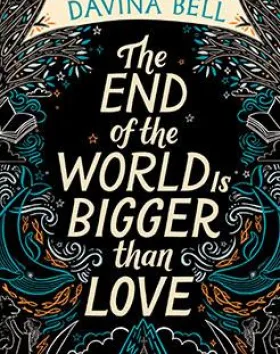
The End of the World is Bigger than Love', Davina Bell
The End of the World is Bigger than Love
Shortlist year: 2021
Shortlist category: Young adult literature
Published by: Text Publishing
She said we didn't know what the world out there had become. We had been alone there so long on that tiny island, in that tiny church.
But in the night, I couldn't bear it.
My chest beat like wings.
Identical twin sisters Summer and Winter live alone on a remote island, sheltered from a destroyed world. They survive on rations stockpiled by their father and spend their days deep in their mother's collection of classic literature—until a mysterious stranger upends their carefully constructed reality.
At first, Edward is a welcome distraction. But who is he really, and why has he come? As love blooms and the world stops spinning, the secrets of the girls' past begin to unravel and escape is the only option.
A sumptuously written novel of love and grief; of sisterly affection and the ultimate sacrifice; of technological progress and climate catastrophe; of an enigmatic bear and a talking whale—'The End of the World Is Bigger than Love' is unlike anything you've read before.
About the author
Davina Bell
Davina Bell is an award-winning author of books for young readers of many ages. She writes picture books including 'All the Ways to be Smart' and 'Under the Love Umbrella', junior fiction 'Lemonade Jones' and middle-grade fiction the 'Corner Park Clubhouse' series. Davina lives in Melbourne, where she works as a children's book editor.
Judges’ comments
This novel is an ode to the love and connection of twin sisters, the coping mechanisms we create in order to deal with trauma and loss, and the ingenuity and strength two young girls find in their quest to survive a world that is 'greying'. In an eerily possible future, the girls create an almost idyllic lifestyle on a remote island without power or the distractions of other people or modern life, reeling from the death of their mother and challenged after their scientist father disappears from their 'safe haven'.
The 'seasonal' twins Winter and Summer, create a somewhat magical existence between them, reading their mother's books to each other and end to end several times over as an act of solace, familiarity and identity. A secret is uncovered about their father's role in the earth tilting off its axis, both metaphorically and physically with dire consequences for their family, and the rest of the human race.
When a stranger comes along, they are forced to save themselves, mortified to discover betrayal and lies … and yet hope prevails. In the end the girls' connection and love, as well as that of their parents is what saves them both, as the ever-nearing end of the world approaches.
This beguiling story leaves you with many unanswered questions and a distressing window into what may lie ahead, into the things that could make the world stop turning, and the things we are willing to sacrifice, in order to save ourselves and the people we love. 'The End of the World is Bigger than Love' will linger in your mind, as you consider what becomes of Summer and Winter in the many layers of this magical tale.
Poetry
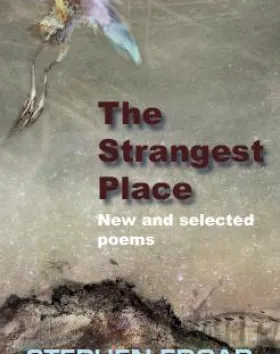
WINNER: 'The Strangest Place, New and Selected Works', Stephen Edgar
The Strangest Place, New and Selected Poems
WINNER
Shortlist year: 2021
Shortlist category: Poetry
Published by: Black Pepper
They have their stratagems too, though they can't move.
They know their part.
Like invalids long reconciled.
To stillness, they do their work through others.
They have turned the world.
To their own account by the twisting of hearts.
The strangest place, this world of fact and figment we astonishingly find ourselves inhabiting, is the territory that Stephen Edgar's poetry has been probing and framing for over four decades now, looking out on the evanescent representations of light and inwards on the mind and 'the gyre of its own consciousness', feeling 'toward the labyrinth just behind Creation's serene surface', as Alan Gould described it, and 'trying to keep faith poetically with that strangeness of the world', in the words of Peter Steele.
'The Strangest Place' offers a retrospective on Edgar's career, with selections from each of his previous ten books. Opening the collection is a book-length section of new poems, 'Background Noise', which continues and extends the range of his meditations, with characteristic technical mastery, interspersed with the title's leitmotiv, whether the notes of lorikeets in the morning trees, echoing voices in an abandoned railway tunnel, the mind's running commentary or the cosmic hum beyond the death of the stars.
About the author
Stephen Edgar
Stephen Edgar was born in Sydney in 1951. Since 2005 he has lived in Sydney. He is married to the poet Judith Beveridge. He has published ten previous collections of poetry in Australia, the three most recent of which were shortlisted for the Prime Minister's Literary Awards, 'Transparencies' in 2018, 'Exhibits of the Sun' in 2015, and 'Eldershaw' in 2014. He won the inaugural Porter Prize (now the Peter Porter Poetry Prize) in 2005 and the inaugural Australian Catholic University Literature Prize in 2013. In 2006 he received the Philip Hodgins Memorial Medal for excellence in literature.
Judges’ comments
Stephen Edgar's latest volume is a work of rare and assured poetic authority. Here is verse that, to adapt words from the poet himself, is unfailingly 'fluent and exact', uttered by a voice that is natural yet refined and civilized, graceful yet unpretentious and grounded, poised and disciplined yet passionate and full of feeling. Edgar has a stern, sometimes dismaying, sense of the bleak realities governing human life, and he remains unconvinced by 'The solaces on which we're buoyed', unpersuaded by 'The old persuasions we would live and die for'. Yet the poems' tragic awareness is, for all that, never sour but instead world-loving and tender, exquisitely sensitive to the 'sumptuous regalia' of the natural world and holding dear the beauties of everyday life; it is, in addition, always compassionate towards human suffering. Edgar's urbanity and erudition, his sense of reality and lack of extravagance, his easy and unforced command of the literary and artistic tradition, make him a poet in the true classic vein.
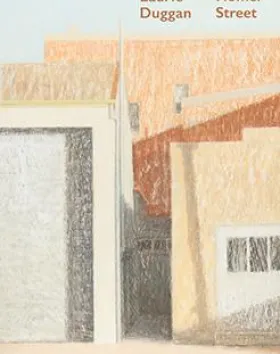
'Homer Street', Laurie Duggan
Homer Street
Shortlist year: 2021
Shortlist category: Poetry
Published by: Giramondo Publishing
A leading figure in Australian poetry, Laurie Duggan has been long celebrated for his vividly sensed observations of everyday life and his minimal and urbane style.
This new collection includes poems written during his last year living in Britain, in Faversham, a market town in east Kent, and those written on a visit to Australia in 2016 and after his return to this country in October 2018. They contribute to two ongoing sequences, 'Allotments', and 'Blue Hills', the second of which alludes to the long-running radio serial of the same name. These sequences, and a third which gives the collection its title 'Homer Street', are made up of the brief haiku-like poems that Duggan has made his own: fleeting impressions, evocations of mood and memory, suburban topographies with their sudden shifts in perspective, glimpses which hint at a larger order of things. As Duggan has noted, 'I'm a minimalist with a lot of content.' The final section, 'Afterimages', engages with a wide range of paintings and painters, from Tintoretto to Tony Tuckson, illuminating the painterly qualities in his own poetry.
About the author
Laurie Duggan
Laurie Duggan, born in Melbourne and later a resident of Sydney, Canberra and Brisbane, moved from Australia to the UK in 2006, and returned to Australia in 2018. His recent books include 'Selected Poems 1971–2017' and 'No Particular Place to Go', and a reissue of his first two books as 'East' and 'Under the Weather'. He is also the author of 'Ghost Nation', a history of modernist tendencies in Australian art.
Judges’ comments
Laurie Duggan is very much a poet in the objectivist and minimalist tradition. He is a consistent adaptor of the raw material of the real. Duggan's poetry is anti-romantic and preoccupied with the mundane. It is a poetry which, to use T.S. Eliot's phrase, lacks tentacular roots, but it shows a very fine ear and an instinctive and masterly sense of form. Ultimately—and to encompass the great movements of the last century—Duggan's poetry comes out of the innovations of William Carlos Williams but he is also a poet capable of very adept adaptations of Martial and he has always been attracted to the revisionist music of Pound at his most imagistic and clean. Duggan also shows an affinity for more recent American poets—Charles Olson and Paul Blackburn among them—but he is essentially a geographer of the imagination which is why his poetry is so preoccupied with topography and is such a testament to his skills as a master craftsman. 'Homer Street'exhibits all this virtuosically and with the greatest variety.
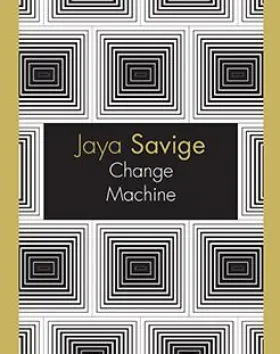
'Change Machine', Jaya Savige
Change Machine
Shortlist year: 2021
Shortlist category: Poetry
Published by: University of Queensland Press
Tough and alert, Savige's shapeshifting poems reflect the world in violent transformation. Bodies scarred by history collide in the ruckus of generations, geopolitics and technology. Elegies appear alongside poems that set a pulse to new life, biometric surveillance, leaf blowers, fatbergs, mechanical pets and military coups. A work of fiercely intelligent artistry, 'Change Machine' is shaped, equally, by felling—its wild originality comes from how it forces the two together.
About the author
Jaya Savige
Jaya Savige was born in Sydney, raised on Bribie Island, and lives in London. He is the author of 'Latecomers', which won the New South Wales Premier's Prize for Poetry, and 'Surface to Air', which was shortlisted for The Age Poetry Book of the Year and the Western Australian Premier's Book Award for Poetry. He has held Australia Council residencies at the B.R. Whiting Studio, Rome, and the Cité Internationale des Arts, Paris. He lectures at the New College of the Humanities at Northeastern, London, and is poetry editor for The Australian.
Judges’ comments
The first thing that impresses about this collection is its sheer technical virtuosity. Savige has an impressive sense of what rhyme can accomplish, when to go for it full-tilt and when to keep it an elusive undercurrent in the reading experience. His diction is immaculate, constantly surprising with the bold, right, unforeseen word. In the art of metrical composition he is also wonderfully accomplished and playful. Yet these poems are not mere technical exercises, and in fact demonstrate that it is possible to combine a high level of formal excellence with a great deal of personal feeling. Emotionally wrenching poems about assisted conception, miscarriage and stillbirth are among the most powerful in the collection, as are the many joyful and complex celebrations of love (romantic, parental, familial). Interspersed are less intense, more cerebral poems—glancing encounters with aspects of modern life—which show how cunningly poetry can operate as a vehicle for (seemingly casual) thought. Innovative and assured, this is a collection that reminds the reader of the endless versatility of poetic forms and the deep pleasures of poetic utterance.

'Shorter Lives', John A Scott
Shorter Lives
Shortlist year: 2021
Shortlist category: Poetry
Published by: Puncher & Wattmann
John A. Scott's Shorter Lives burrows below the received biographies of seven Modernist artists/writers to disinter the various secrets that arguably underpin, explain and give force to their work. Employing a blend of innovative sonnet-sequences and prose poems these new 'histories' break from existing biographies, offering alternative facts and believable untruths, to become a probing of Modernity itself. 'While brilliant throughout, Scott is at his best when considering the depravities and excesses of the male artistic ego, and the corresponding traumas it inflicts on the lives of the female artists, writers and muses within its orbit.' (Sarah Holland-Batt, Weekend Australian).
About the author
John A Scott
John A. Scott's works have been translated and published internationally. He has won the Victorian Premier's Prize for both poetry 'St Clair: Three Narratives' and fiction 'What I Have Written'. His numerous shortlistings include the Miles Franklin Award for both 'Before I Wake' (1997), and 'The Architect' (2002). Scott won the 2013 Peter Porter Poetry Prize; and his prose poem, 'Picasso' (which forms part of 'Shorter Lives'), received the 2014 David Harold Tribe Award. His major experimental novel, 'N', (2020) was shortlisted for the Victorian Premier's Prize and was one of The Guardian's Books of the Year.
Judges’ comments
In this highly original and extraordinary book, Scott explores the bizarre lives of some of the pivotal figures of early modernism in literature and art, such as Rimbaud, Virginia Stephen (later Woolf), Mina Loy, André Breton, Picasso. We do not expect poetry on the epic scale which Scott employs here in long bursts of language which become highly expressive, because of their epic quality. Although epic, not a word is wasted. Scott is always detached and in control, and his language sharp, but the emotion is at times overwhelming. He alternates between passages of prose poetry and 14-line unrhymed stanzas to propel his narratives forward. He uniquely selects a small coruscating detail to illuminate an entire, usually tragic, life. Mina Loy starts out as the young beautiful sex-priestess of the Futurists. By the end of her life, she is silly, garrulous, loveable, the ageing coquette. Most of the lives are factual. Only André Breton in Melbourne in 1942 is a hilarious and sublime counter-factual which lifts off the page in an amazing flight of fantasy. The grimmest life is Picasso's, a terrible #MeToo story of abusing women, which begins with his uncle breathing cigar smoke into the newborn Picasso, and ends with Picasso dying, having shrunk into a 'brown wrinkled manikin drowsy in his cot', as Don Salvador's smoke is finally expelled.
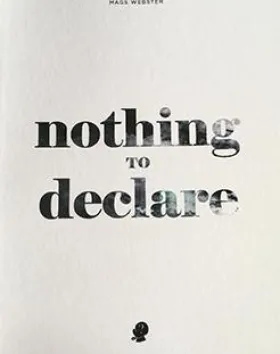
'Nothing to Declare', Mags Webster
Nothing to Declare
Shortlist year: 2021
Shortlist category: Poetry
Published by: Puncher & Wattmann
A collection of poetry by Western Australian-based poet Mags Webster, 'nothing to declare' contains poems ranging 'through worlds of wide reading, inner and outer journeying, through both the historic and the personal past and present, the fleshly and the vegetal ... subtle and confronting at the same time, these are the fruits of a startling talent' (Tracy Ryan, poet). Sometimes set in Australia or Hong Kong, sometimes in the imagined worlds of literary figures or in the life of the mind, these poems probe myriad interstices between words and silences, poetry and language, attraction and despair.
About the author
Mags Webster
Mags Webster is a poet, researcher, freelance writer and editor, whose poems, essays and reviews have appeared in various journals and anthologies in Australia, Asia and America. In 2020 she completed a PhD in creative writing at Murdoch University in Western Australia. Mags' most recent poetry collection is called 'nothing to declare'. Her first book, 'The Weather of Tongues' won Australia's 2011 Anne Elder Award for best debut collection of poetry. Mags moved to Australia in 2003. From 2011 to 2014, Mags lived, worked and studied in Hong Kong.
Judges’ comments
Mags Webster is a seriously exciting and excitable poet who can flip from sensual lyricism to sudden confrontation. In the title-poem 'nothing to declare' she sees herself as 'in love with countries' and driven by 'nomadic need'. She values when 'we're still naked and unshelled, yet to strike / out of our night-selves. It's when I'm likely to be truthful'. In her pitch-perfect poem 'Bonnard beauty reveals all', the model tells us 'I must be / the cleanest muse in Christendom'. She describes her pose: 'my legs / so decorously crossed' in the 'lapping tongues' of the bath water from which 'the steam has quite / died down'. At the end of the session, Bonnard whispers'it's time to cover yourself up'. She imagines how he will 'work on me // until late at night' long after the bath has cooled and she has left. He'll be dabbing 'at my breasts / and thighs' and she will 'recede into / a wash of stipple and blur'. She rises from the bath and as she takes the towel 'from his outstretched hand, / it's the only time his eyes / can meet mine.' 'Pauses in transit' is another pitch-perfect poem, described as 'after Octavio Paz'. But the final brilliant image is Webster's, as she describes a butterfly alighting on the 'concrete cliff' thirty-nine stories high of a Hong Kong building, where it 'spreads / a tiny book / of papery wings'. With this second volume, she is well on the way to becoming a significant new voice in Australian poetry.
Australian history

WINNER: 'People of the River: Lost Worlds of Early Australia', Grace Karskens
People of the River: Lost Worlds of Early Australia
WINNER
Shortlist year: 2021
Shortlist category: Australian history
Published by: cover
Dyarubbin, the Hawkesbury-Nepean River, is where the two early Australias—ancient and modern—first collided. 'People of the River' journeys into the lost worlds of the Aboriginal people and the settlers of Dyarubbin, both complex worlds with ancient roots.
The settlers who took land on the river from the mid-1790s were there because of an extraordinary experiment devised half-a-world away. Modern Australia was not founded as a gaol, as we usually suppose, but as a colony. Britain's felons, transported to the other side of the world, were meant to become settlers in the new colony. They made history on the river: it was the first successful white farming frontier; a community that nurtured the earliest expressions of patriotism; and it became the last bastion of eighteenth-century ways of life.
The Aboriginal people had occupied Dyarubbin for at least 50,000 years. Their history, culture and spirituality were inseparable from this river Country. Colonisation kicked off a slow and cumulative process of violence, theft of Aboriginal children and ongoing annexation of the river lands. Yet despite that sorry history, Dyarubbin's Aboriginal people managed to remain on their Country, and they still live on the river today.
The Hawkesbury-Nepean was the seedbed for settler expansion and invasion of Aboriginal lands to the north, south, and west. It was the crucible of the colony, and the nation that followed.
About the author
Grace Karskens
Grace Karskens is author of The Colony, winner of the 2010 Prime Minister's Non-fiction Award, and of The Rocks, winner of the 1998 NSW Premier's History Award. She is Emeritus Professor of History in the School of Humanities and Languages at the University of New South Wales, a Fellow of the Australian Academy of the Humanities, and a Fellow of the Royal Society of New South Wales.
Judges’ comments
By researching widely in the humanities and sciences, Grace Karskens has crafted an epic history of the Hawkesbury-Nepean River. Like the river itself, this engaging work twists and turns, sometimes switching back on itself, to capture the complex interplay between the waterway and its environs, the people who have called it home for millennia, and those who have arrived over the last 230 years. Unlike some recent fictionalised works suggesting that a single massacre by Europeans soon after their arrival, wiped out the Aboriginal people of the river, Karskens' meticulous scholarship reveals a far more intricate story of interdependence. This includes the sharing of Commons land and crops, bushcraft and tracking, and a mutual love of horse racing. As Karskens says, 'massacre history implies that there were no battles, no resistance and no survivors', an implication that is patently false. Throughout the text, Karskens generously acknowledges her fellow historians, as well as Aboriginal knowledge-holders, and experts in the fields of ecology, geology, soil science, flood and fire risk, linguistics, anthropology and archaeology. However, in drawing on those who have preceded her, Karskens has created a work that is fresh, vibrant and all-encompassing.
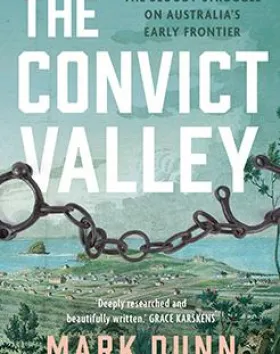
'The Convict Valley: The Bloody Struggle on Australia's Early Frontier', Mark Dunn
The Convict Valley: The Bloody Struggle on Australia's Early Frontier
ortlist year: 2021
Shortlist category: Australian history
Published by: Allen & Unwin
In 1790, five convicts escaped Sydney by boat and were swept ashore near present-day Newcastle. They were taken in by the Worimi people, given Aboriginal names, and started families. Thus began a long and at times dramatic series of encounters between Aboriginal people and convicts in the second penal settlement in Australia.
The fertile valley of the Hunter River was the first area outside the Sydney basin explored by the British, and it became one of the largest penal settlements. Today manicured lawns and prosperous vineyards hide the struggle, violence and toil of the thousands of convicts who laid its foundations. The Convict Valley uncovers this rich colonial past, as well as the story of the original Aboriginal landholders. While there were friendships and alliances in the early years, in the later scramble for land in the 1820s—as the Valley was opened to free settlers—tensions rose and bloodshed ensued.
With fascinating stories about convicts, white settlers and the Aboriginal inhabitants that have long been forgotten, 'The Convict Valley' is a new Australian history classic.
About the author
Mark Dunn
Mark Dunn is a public historian and former chair of the Professional Historians Association of NSW and ACT. He is descended from convicts who settled in the Hunter, and he has spent two decades investigating the history, heritage and archaeology of the region.
Judges’ comments
'The Convict Valley' is a study of the colonial invasion of the Hunter Valley in NSW. Known today for its vineyards, horse studs, cattle and coal mines, it stretches northwest from Newcastle to the escarpment overshadowing Murrurundi. Until a boatload of convict escapees from Sydney washed ashore near Port Stephens in 1790, this was the traditionally managed, undisturbed country of the Worimi, Kamilaroi, Wonnarua, Birpa and Awabakal people, a landscape richly endowed with food resources and imbued with a culture evident in numerous rock art and ceremonial sites.
Mark Dunn's narrative history traces, in large part, the interplay between Aboriginal people, convicts, and free settlers from their earliest peaceful encounters to the bloody struggle that accompanied the land rush of the 1820s. Importantly, he restores to centre stage the valley's original inhabitants and defenders, and the convicts whose labour laid the foundations for the industry and wealth characterising the Hunter today.
Beautifully written and finely researched, Dunn successfully balances multiple perspectives in a nuanced work that never loses sight of the fundamental role played by Aboriginal people, whose 'skill, knowledge and bushcraft' many colonists relied on, but who were 'excluded from the very economy they had helped establish'.
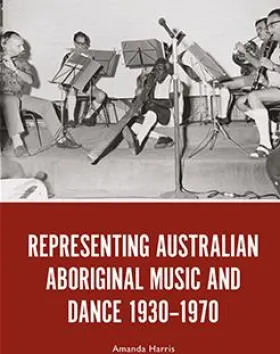
'Representing Australian Aboriginal Music and Dance 1930–1970', Amanda Harris
Representing Australian Aboriginal Music and Dance 1930–1970
Shortlist year: 2021
Shortlist category: Australian history
Published by: Bloomsbury Publishing
'Representing Australian Aboriginal Music and Dance 1930–1970' offers a rethinking of recent Australian music history. Amanda Harris presents accounts of Aboriginal music and dance by Aboriginal performers on public stages. Harris also historicises the practices of non-Indigenous art music composers evoking Aboriginal music in their works, placing this in the context of emerging cultural institutions and policy frameworks. Centralising auditory worlds and audio-visual evidence, Harris shows the direct relationship between the limits on Aboriginal people's mobility and non-Indigenous representations of Aboriginal culture.
This book listens to Aboriginal accounts of disruption and continuation of Aboriginal cultural practices and features contributions from Aboriginal scholars Shannon Foster, Tiriki Onus and Nardi Simpson as personal interpretations of their family and community histories. Contextualising recent music and dance practices in broader histories of policy, settler colonial structures, and post-colonising efforts, the book offers a new lens on the development of Australian musical cultures.
About the author
Amanda Harris
Amanda Harris is a research fellow at Sydney Conservatorium of Music and Director of the Sydney Unit of digital archive PARADISEC. Her research focuses on gender, music, and cross-cultural Australian histories. She is editor of 'Circulating Cultures: Exchanges of Australian Indigenous Music, Dance and Media' (2014) and co-editor of 'Research, Records and Responsibility' (2015) and 'Expeditionary Anthropology' (2018).
Judges’ comments
Amanda Harris's 'Representing Australian Aboriginal Music and Dance 1930-1970' is an unusual book that manages to take what sounds like an academic exercise and weave it into a charming, thoughtful and utterly compelling narrative about mainstream Australia's slow 20th century awakening to Aboriginal culture. Harris, a research fellow at the Sydney Conservatorium of Music, shows how Aboriginal music and dance developed to the point where both sit now at the centre of the nation's cultural agenda. With contributions from Aboriginal scholars Shannon Foster, Tiriki Onus and Nardi Simpson, the book tracks the development of government policies, the history of the struggle for Indigenous rights and the media and general public's increasing engagement with Aboriginal music and dance. The artists and performers come alive in its pages. From the hymns written by Shannon Foster's influential great grandfather Tom Foster to the velvet smooth singing of Jimmy Little this really is a fascinating read.

'Pathfinders: A History of Aboriginal Trackers in NSW', Michael Bennett
Pathfinders: A History of Aboriginal Trackers in NSW
Shortlist year: 2021
Shortlist category: Australian history
Published by: NewSouth Publishing
There are few Aboriginal icons in White Australia history.
From the explorer to the pioneer, the swagman to the drover's wife, with a few bushrangers for good measure, Europeans play all the leading roles. A rare exception is the redoubtable tracker. With skills passed down over millennia, trackers could trace the movements of people across vast swathes of country. Celebrated as saviours of lost children and disoriented adults, and finders of missing livestock, they were also cursed by robbers on the run.
Trackers live in the collective memory as one of the few examples of Aboriginal people's skills being sought after in colonial society. In New South Wales alone, more than a thousand Aboriginal men and a smaller number of women toiled for authorities across the state after 1862. This book tells the often unlikely stories of trackers including Billy Bogan, Jimmy Governor, Tommy Gordon, Frank Williams and Alec Riley.
Through his work on native title claims, historian Michael Bennett realised that the role of trackers—and how they moved between two worlds—has been largely unacknowledged. His important book reveals that their work grew out of traditional society and was sustained by the vast family networks that endure to this day. 'Pathfinders' brings the skilled and diverse work of trackers not only to the forefront of law enforcement history but to the general shared histories of black and white Australia.
About the author
Michael Bennett
Michael Bennett has worked as an historian in native title since 2002, preparing evidence and writing reports for claims throughout NSW. It was through conducting research for native title claims that he first realised the extent to which the NSW Police relied on trackers for their expert skill. He grew up in Dubbo where he first learned of the exploits of Tracker Alex Riley.
Judges’ comments
Michael Bennett's 'Pathfinders' profiles Aboriginal trackers and explains the contribution they made to law enforcement in New South Wales. This is an important but neglected aspect of our history. This book draws on extensive archival research, oral history interviews, secondary sources and field work. But it is the author's flair for storytelling that brings this history vividly to life. This book explains how Indigenous customs and traditions, learned over 60,000 years, were intrinsic to their work whether it was catching bushrangers, finding lost children or missing farm animals. These trackers were highly skilled and a rare example of Indigenous skills transferable to the colonial economy. Tracking was more than just following a trail of footprints; it was understanding human behaviour, how to navigate rivers and landscapes, knowledge of plants and animals, and being able to negotiate with communities. These skills were passed on from generation to generation and remain valuable today, including in native title recognition. This book also grapples with terrible interactions that many Indigenous Australians had with law enforcement. Some Indigenous Australians were hostile to those men and women who cooperated with police. These trackers were invariably treated as heroes and saviours, and dreaded by criminals. This book is well researched and written, and makes a substantial contribution to better understanding our past.
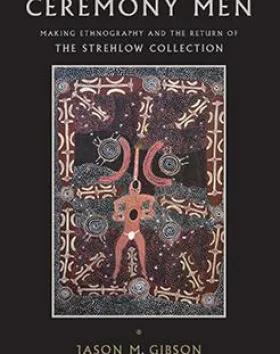
'Ceremony Men: Making Ethnography and the Return of the Strehlow Collection', Jason M Gibson
Ceremony Men: Making Ethnography and the Return of the Strehlow Collection
Shortlist year: 2021
Shortlist category: Australian history
Published by: State University of New York Press
'Ceremony Men' investigates the significance of one of Australia's greatest collections of Indigenous song, story, and ceremony—the collections of the linguist and anthropologist T. G. H. Strehlow. By critically interrogating Strehlow's collection in partnership with contemporary Arrernte and Anmatyerr people, the book challenges the centrality asserted by Strehlow in the making of 'his collection'. Gibson restores balance by highlighting the instrumental role played by the many Aboriginal people that guided and educated Strehlow over four decades and illuminates the depth of cultural knowledge maintained by their descendants.
About the author
Jason M Gibson
Jason Gibson is an anthropologist and historian who has worked extensively with Aboriginal custodians throughout Australia on history, museum, and heritage related projects. He has contributed to some of the biggest and most important Australian repatriation and community engagement initiatives, including two public online repositories of Indigenous cultural heritage. He has served as a Repatriation Curator with the Melbourne Museum, taught Indigenous Studies at Monash University and is currently an Alfred Deakin Postdoctoral Research Fellow at Deakin University.
Judges’ comments
An old man in the Strehlow Research Centre at Alice Springs watches himself on film made years earlier by Strehlow. He quietly explains fine points of the ceremony and begins an excited conversation with his family. From the 1930s, Central Australian men invited Strehlow to record performances and gave and sold him ceremonial objects. They did this for their own reasons and the resulting collection is a collaborative effort. Decades later the author began journeying on country with Anmatyerr men through the film and recordings from the collection. Individuals recognised their fathers and places and the archive gained further meaning. Strehlow, born on country and fluent in local language, believed he was preserving a past. Anmatyerr responses to the archive reveal social memory and a living present. They assessed Strehlow as a 'high school' man, not a ceremonial leader. No one had earlier thought to ask 'the informants' what they thought of the anthropologist. The Ceremony Men are the ritual owners, experts in the complex relationships between people, place and Dreaming. Their tradition is dynamic. The 'beautiful and dangerous' archive has contemporary relevance. The museum-men may be integrated into ritual as ceremonial assistants sharing responsibility for this remarkable archive with the ritual experts.


